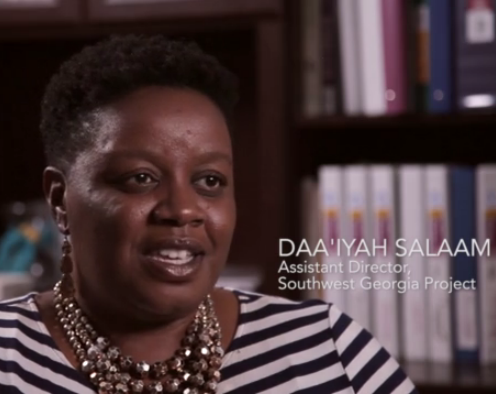Race, community engagement and an integrated dance

The Southwest Georgia Project for Community Education helped integrate a school prom in rural Wilcox County two years ago. Daa'iyah Salaam, a former business development specialist with the group, says the dance offered an opportunity for deeper conversations about race. (Image is a still from the video below.)
The Mary Reynolds Babcock Foundation funds organizations in the South working to move people and places out of poverty. The foundation recently launched a "Southern Voices" oral history project to capture the stories of Southern leaders working for social and economic justice. The latest installment, inspired by a recent HBO documentary on the tradition of holding racially segregated proms in some areas of rural Georgia, features stories about how collaborative efforts can lead to lasting changes. For more stories from the project, click here. (Disclosure: The Mary Reynolds Babcock Foundation is a funder of the Institute for Southern Studies.)
* * *
HBO debuted a documentary this month that set out to tell the story of a Georgia high school's first integrated prom but uncovered a hornet's nest of racial conflict. "Southern Rites" focused on Montgomery County as students merged their "white prom" and "black prom," sparking bitter backlash from many residents who didn't take kindly to the disruption of the status quo. A New York Times article about the segregated proms sparked a national outcry, but no one in rural Georgia was surprised. Separate dances are commonplace there. The Southwest Georgia Project for Community Education recently helped integrate a prom in Wilcox County, four counties away.
"In 2013, it was the very first time having an integrated prom. Ever. And we actually had to have it in another county. It wasn't in that particular county," said former Business Development Specialist Daa'iyah Salaam, who says the dance was an opportunity to introduce deeper conversations about race. Racial healing is one of SWGAP's focus areas, though it's frequently brought up in other contexts, like the integrated prom or projects involving education or economic development. "In organizing around our racial tensions, depending on where we are, we try to get a common goal," Salaam said. "We don't actually explicitly say 'race' at all. We don't explicitly say, 'We're working on race relations.' We just want people to come together. … Our strategy depends on the feedback that we get and how open people really are about talking about racism and race relations."
The integrated prom in Wilcox County was a big success, but it couldn't have happened without community engagement. The effort involved several dedicated students, a savvy social media strategy and the support of family and community. The privately organized dance paved the way for Wilcox County High School to hold its first school-organized, integrated prom in 2014, and a second one this year.
SWGAP isn't the only organization that finds opportunity at the intersection of community engagement and race; in fact, it's one of the primary reasons McIntosh SEED was created. The advocacy group in eastern Georgia facilitates collaboration among black and white residents to address the conditions that contribute to poverty in their communities. "Just 10, 12 years ago, there wasn't a lot of communication between blacks and whites in this community, and as this organization was formed, it started a dialogue among black and white people," said Executive Director John Littles. "It brought about a lot of challenges, a lot of threats for this organization. There were many people who didn't want to see this type of action of people looking to address issues or communications between black and white in this community. And our process allowed for that to take place. It started strengthening relationships; it started deepening relationships ... and a lot of people were threatened by that to see this going on, blacks and whites communicating — something could happen. Something positive could happen. And it did. We rolled out programs and started addressing them."
Demolishing artificial barriers to build stronger, unified communities is a formula that's achieving victories all over the South. According to North Carolina Latino Coalition Executive Director and Durham CAN Lead Organizer Ivan Parra, a diverse coalition of civically engaged people is a powerful agent of change, even if not everyone is working toward the same goals all the time. "You need to build on what is similar around people, but you have to do it in a way that still respects the self interests of each of the communities. So when we’re working on a campaign and we have an issue and we have African-Americans and Latinos working together, we understand that they have two different sets of priorities and that some are similar, but that if we build relationships, today, Latinos will support African-Americans because they're their friends because tomorrow, they will be the opposite. So there's gotta be that sense of reciprocity. ... 'Cause when they sit together and they start talking about why they migrated here or what happened, what conditions they had when they grew up, what ends up happening is that they say, 'We're not that different. Perhaps we were born in different countries, but our families also migrated. Our families also had issues of poverty, or our families are facing the same difficulties.' And once they do that, they find the strength to be able to support one another even though sometimes there's not a clear gain for either one. But they know that tomorrow is my turn."
In Durham, these collaborative efforts recently won higher wages for Duke University employees, increased lead paint testing in low-wealth communities and prompted major changes in local police procedure. As Parra puts it, it all comes down to our basic nature: "Human beings are human beings and if you go build a relationship with somebody and just listen to them and understand who they are and what they want and what they care about, it doesn’t matter if they're Latino or they're African-American or they're poor or educated or uneducated. People have a desire to be listened to and to contribute and to be part of something, and that applies to all different communities."
